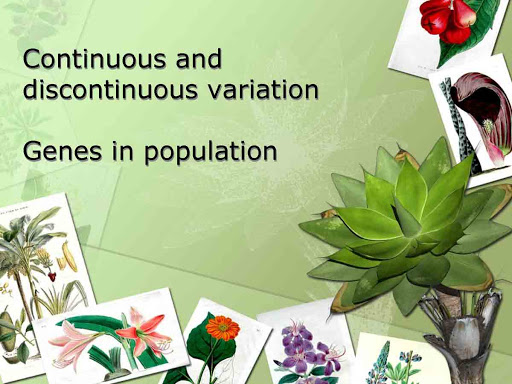What is the difference between continuous and discontinuous variation?
Genetic variation occurs in the form of continuous and discontinuous variation. Mutation and genetic recombination are responsible for genetic variations.
The core difference between continuous and discontinuous variation is that continuous variation unbroken range of phenotype in a population of a particular character while discontinuous variation shows two or more separate forms of character in a population.

What Is Continuous Variation?
Continuous variation is a genetic variation that shows an unbroken range of phenotype of a particular character in a population. The continuous range makes it difficult to classify them.
Examples of continuous variables are weight, height, and length of organisms. Environmental factors tend to influence the phenotypic variation of organisms
Characteristics of Continuous Variation
- Show intermediate grouping
- Have a smooth and bell shape curve
- Tend to be quite common
- A lot of genes are involved in the determination of a trait
- No correspondence of genotype and phenotype
What Is Discontinuous Variation?
Discontinuous variation is a genetic variation that portrays two or more separate forms of a character in a population.
The discontinuous range of the phenotype makes it quite easy to categorize. Examples of discontinuous variation are the gender of animals, blood groups of animals and petal colors of the plants.
Characteristics of Discontinuous Variation
- Show two or more separate form of character
- The simplest form of genetic variation
- The trait of the organism is predictable
- Evolution tends to influence the genetic system
- Tend to develop periodically
Comparison Chart: Continuous Variation Vs Discontinuous Variation
| Basic Terms | Continuous Variation | Discontinuous Variation |
| Meaning | It is a type of genetic variation that shows an unbroken range of phenotype of a character in a population | It is a genetic variation which shows two or more form of a character in a population |
| Role of phenotype | Have a continuous range hence difficult to classify | Have discontinuous range hence easy to classify |
| Intermediate grouping | Tend to happen | Do not occur |
| Graphical representation | Tend to have a smooth and bell shape curve | Tend not to have a curve shape |
| Role of genetic variation | Quite common | Simplest form |
| Number of genes | Have many genes | Have fewer genes |
| Correspondence of Genotype and Phenotype | Has no correlation | Has one on one correlation |
| Genetic system | Do not influence the genetic system | Tend to influence genetic system |
| Alternative name | Fluctuation | Mutation |
| Examples | Weight, height, and length | Blood groups, petal colors, and gender |
| Evolution | Increases adaptability | Result in new species |
Differences between Continuous and Discontinuous Variation
- The continuous variation results in fluctuation of mean species while discontinuous variation results in the mutation of species
- Continuous variation direction is predictable while that of discontinuous variation is unpredictable
- Evolution makes a continuous variation to increase the adaptability of species while discontinuous variation result in new species
- Continuous variation occurs due to segregation of chromosomes during gamete formation while discontinuous variation occurs due to changes in genes
- A continuous variation is also known as fluctuation while discontinuous variation as mutation
- Continuous variation produces smooth and bell shape curve while discontinuous variation has no curve type in graphical representation
- Continuous variation is quite common while discontinuous variation occur occasionally
- Continuous variation do not disturb genetic composition while discontinuous variation disturb the genetic composition
- The genotype and phenotype is not correspondence to continuous variation while correlating in discontinuous variation
- Examples of continuous variables are weight, height, and length while discontinuous variation is blood group, gender, and color of petals.
Similarities between Continuous and Discontinuous Variation
- Both are a type of genetic variation
- Both occur due to variation in DNA
- Both causes phenotypic variation in different aspect
You May Also Like:
- Difference between DNA and RNA
- Difference between Deoxyribose and Ribose
- Difference between Linkage and Crossing Over
- Difference between Single-Stranded DNA and Double-Stranded DNA
Comparison Video
Summary
The main difference between discontinuous and continuous variation is that discontinuous variation causes changes in the genetic system while continuous variation does not cause change.